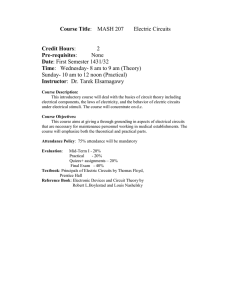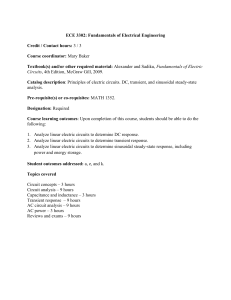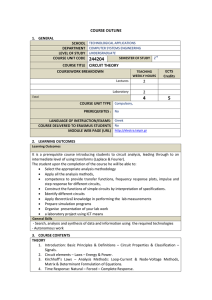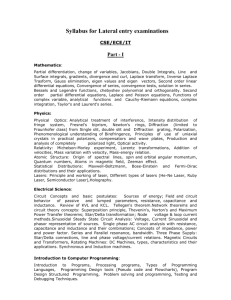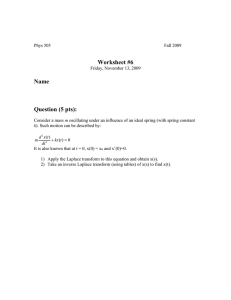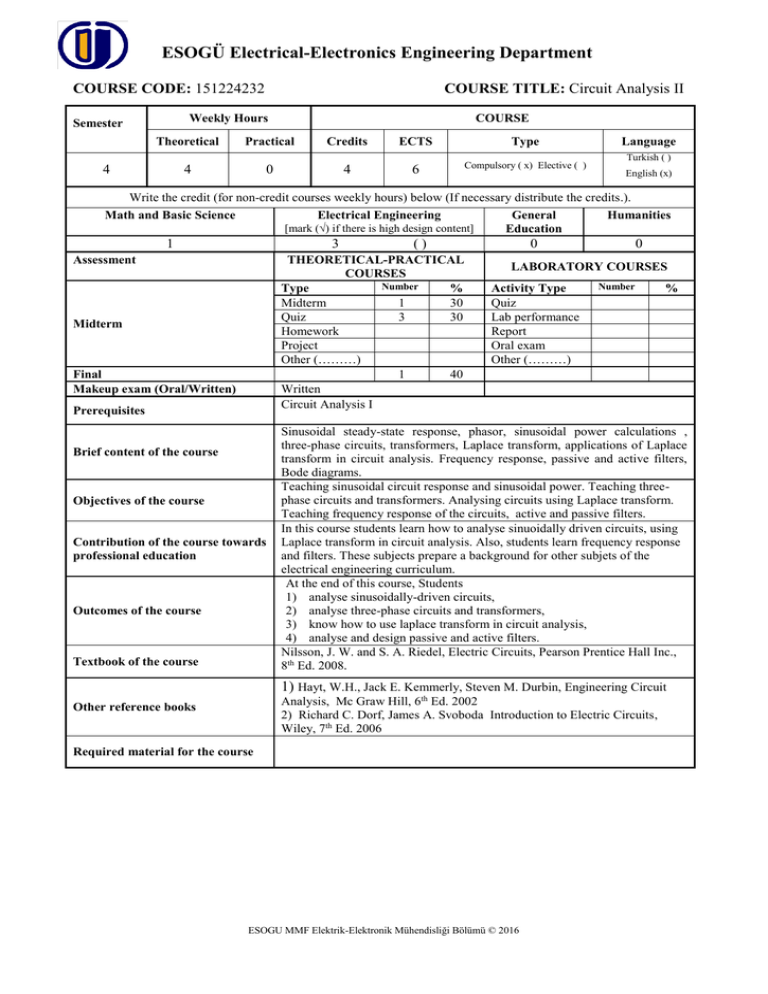
ESOGÜ Electrical-Electronics Engineering Department
COURSE CODE: 151224232
COURSE TITLE: Circuit Analysis II
Weekly Hours
Semester
COURSE
Theoretical
Practical
Credits
ECTS
Type
4
0
4
6
Compulsory ( x) Elective ( )
4
Language
Turkish ( )
English (x)
Write the credit (for non-credit courses weekly hours) below (If necessary distribute the credits.).
Math and Basic Science
Electrical Engineering
[mark () if there is high design content]
1
3
Assessment
Final
Makeup exam (Oral/Written)
Prerequisites
Brief content of the course
Objectives of the course
Contribution of the course towards
professional education
Outcomes of the course
Textbook of the course
Humanities
0
0
()
THEORETICAL-PRACTICAL
COURSES
Number
Type
%
Midterm
1
30
Quiz
3
30
Homework
Project
Other (………)
1
40
Written
Circuit Analysis I
Midterm
General
Education
LABORATORY COURSES
Activity Type
Quiz
Lab performance
Report
Oral exam
Other (………)
Number
%
Sinusoidal steady-state response, phasor, sinusoidal power calculations ,
three-phase circuits, transformers, Laplace transform, applications of Laplace
transform in circuit analysis. Frequency response, passive and active filters,
Bode diagrams.
Teaching sinusoidal circuit response and sinusoidal power. Teaching threephase circuits and transformers. Analysing circuits using Laplace transform.
Teaching frequency response of the circuits, active and passive filters.
In this course students learn how to analyse sinuoidally driven circuits, using
Laplace transform in circuit analysis. Also, students learn frequency response
and filters. These subjects prepare a background for other subjets of the
electrical engineering curriculum.
At the end of this course, Students
1) analyse sinusoidally-driven circuits,
2) analyse three-phase circuits and transformers,
3) know how to use laplace transform in circuit analysis,
4) analyse and design passive and active filters.
Nilsson, J. W. and S. A. Riedel, Electric Circuits, Pearson Prentice Hall Inc.,
8th Ed. 2008.
1) Hayt, W.H., Jack E. Kemmerly, Steven M. Durbin, Engineering Circuit
Analysis, Mc Graw Hill, 6th Ed. 2002
2) Richard C. Dorf, James A. Svoboda Introduction to Electric Circuits,
Wiley, 7th Ed. 2006
Other reference books
Required material for the course
ESOGU MMF Elektrik-Elektronik Mühendisliği Bölümü © 2016
WEEKLY PLAN OF THE COURSE
Week
1
2
3
4
5
6
7
8
9
10
11
12
13
14
15,16
NO
1
2
3
4
5
6
7
8
9
10
11
Topics
Sinusoidal steady state response. Phasors.
Analysis of AC circuits by phasor method.
AC power calculations. Average power, reactive power, complex power, power factor.
Balanced three-phase circuits. Analysis Y-Y connected circuit.
Analysis Y-∆ connected circuit. Power calculations in 3-phase circuits.
Transformers
Laplace transform.
Midterm
Midterm
Application of Laplace transformation in circuit analysis
Convolution, transfer function, impulse response
Frequency response, resonance circuits.
Passive filters, Bode diagrams
Active filters
Final
OUTCOMES OF THE PROGRAMME
4
Adequate knowledge of mathematics, science and Electrical and Electronic Engineering;
ability to practice theoretical and practical knowledge of these areas into modeling and
solving complex problems of Electrical and Electronic Engineering
Ability to identify complex engineering problems in Electrical and Electronic Engineering
and related fields, for this purpose having skills to formulate, select and apply appropriate
methods.
3
2
x
x
Having skills to apply modern design methods to design a complex system, process,
equipment or product that should work under realistic conditions and constraints and
satisfy specific requirements concerning the Electrical and Electronic Engineering.
Having skills to develop, select and apply modern techniques and tools needed to analyze
and solve complex applications in Electrical and Electronic Engineering, skills to use
information technology effectively.
Skills to design and conduct tests, collect data, analyze results, and interpret data for the
experimental investigation of complex problems in Electrical and Electronic Engineering
Ability to function effectively as an individual and as a member of teams within the
discipline and in multidiscipline areas.
Communicating effectively in oral and written form both in Turkish and English.
Effective report writing and understanding written reports, preparing design and
manufacturing reports, making effective presentations, skills to give and receive clear and
concise instructions.
Awareness of the necessity of lifelong learning, access to information, monitoring
developments in science and technology and the ability to self-renewing
Understanding of professional and ethical responsibility
Information on project management, change management and risk management practices,
awareness on entrepreneurship and innovation, knowledge on sustainable development.
Information about universal and societal effects of engineering applications on health,
safety and environment; awareness of the legal consequences of engineering solutions.
x
x
x
x
x
x
x
x
x
Scale for assessing the contribution of the course to the program outcomes:
4: High
3: Medium
2: Low
1:None
Name of Instructor(s):
Signature(s):
Date: 08/03/2016
ESOGU MMF Elektrik-Elektronik Mühendisliği Bölümü © 2016
1

